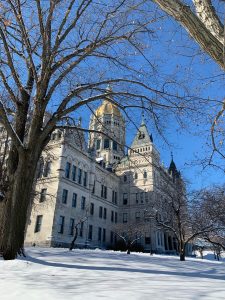Connecticut’s state legislative session began January 6, and will run through June 2. It’s a “long session”—a year our legislators focus on developing the state budget for fiscal years 2022 and 2023, in addition to passing and updating other legislation.
This session will look unlike years past in many ways as the continued COVID pandemic prevents in-person meetings. While this presents definite advocacy challenges, we’re hopeful that virtual hearings may actually provide increased ability for people who might not normally be able to get up to Hartford to engage in legislative processes, and we will create opportunities for you to connect with your state senator and representative.
Below are Save the Sound’s priorities for this session. From now through early June, we’ll keep you updated as opportunities arise to talk with your legislators about what matters most to you (if you don’t already get our email action alerts, sign up here).
Thank you, as always, for your commitment to a healthy environment and strong communities.

Climate and Energy
Global Warming Solutions Act Accountability:
- Establish a citizen suit provision to facilitate enforcement.
- Require greenhouse gas reduction targets be an explicit consideration in state actions.
Clean Energy: Codify Governor Lamont’s 100% clean energy goal to provide statutory security that can be used in regulatory decision-making.
Electric Vehicles:
- Ratify the Transportation and Climate Initiative, establishing a declining limit on greenhouse gas emissions from the transportation sector.
- Establish state medium- and heavy-duty vehicle standards.
- Transition state fleet to 100% electric by 2030 for light–duty vehicles, and by 2040 for medium- and heavy-duty vehicles.
- Transition 30% of school buses to zero-emission by 2030, and 100% by 2040.
- Expand rebates for EVs to achieve 20% zero-emission vehicle penetration statewide by 2030 and 95% by 2050.
Protect Energy Efficiency and Clean Energy Funds
Long Island Sound and Rivers
Dam Disclosure: Improve public understanding of the risks of under-maintained dams and increase transparency by including on real estate disclosure forms a question about the presence of a dam on the property.
Sewage Right to Know Act: Improve the system for notifying downstream communities of sewage spills and ensure prompt, full notification. (This summer’s Mill River spill in Hamden/New Haven illustrates the need to improve this law.)
Municipal Investment Options: Provide municipalities with the right to generate revenue and invest in climate resilience, flooding, and water pollution abatement.
Provide Resiliency Funding: Enhance resiliency bonding to ensure Connecticut can provide nature-based solutions—like green infrastructure and living shorelines—for flood management and limiting sea level rise impacts.
Blue Plan: Approve the Long Island Sound Blue Plan, as recommended by the Environment Committee last year, to protect the Sound’s many uses and resources.
Environmental Justice and Defending Laws
Strengthening Connecticut’s Environmental Justice Law:
- No permit shall be granted by DEEP or Siting Council if it would result in cumulative environmental or public health impacts (combined past, present, and foreseeable pollution) in an already overburdened community that are higher than those borne by other communities, unless the permitted activity serves a compelling public purpose in that community.
- Require environmental justice impact statement by applicant, to be approved by DEEP or Siting Council and to be used in determination of whether a permit can be granted.
- Require formal response to comments made by the public.
- Ensure application of EJ Law is comprehensive (facilities covered, definition of EJ communities, permits that trigger requirements).
- Limit time between public hearing process and permit application submission to ensure public stays engaged in both public hearing and actual permitting process (or require continued engagement between these processes).
- Add citizen suit provision for failure to comply with EJ Law.
- Expand notification of public process (non-English newspapers, direct mailings).
- Fee for certain applications, determined impacts—to fund EJ programs.
Defend Laws: Safeguard against attempts to roll back Connecticut environmental laws that protect public health, open spaces, or air and water quality.
Mitigate Impact of 2022 Retirement Cliff: Allow for rehires now, protect funds for rehiring in those jobs that retire at DEEP, and transition resources to robust e-governance systems that support the regulated community and the general public. Ensure environmental enforcement and oversight.
State Budget
Protect Energy Efficiency and Clean Energy Funds
Provide Clean Water Funding
Provide Resiliency Funding: Enhance resiliency bonding to ensure Connecticut can provide nature-based solutions—like green infrastructure and living shorelines—for flood management and limiting sea level rise impacts.
Mitigate Impact of 2022 Retirement Cliff: Allow for rehires now, and protect funds for rehiring in those jobs that retire at DEEP.
